
- Last Updated On
- August 20, 2023

Health Care in Canada for Tourists: Essential Info and Tips

Ready to explore Canada’s vast, scenic beauty with the whole family?
Before you go, it’s crucial to familiarize yourself with their healthcare system.
It’s a vital step towards a worry-free family adventure.
Although Canada boasts a universal health care system, how does that translate for globetrotters like you?
Allow me to guide you through health care in Canada for tourists.
Let’s ensure you have all the details to make your journey safe and delightful.
Keep in mind that the Canada Health Act governs the Canadian health care system, offering wide-ranging services to its residents.
But here’s a nugget to remember: while locals enjoy blanket coverage, you may not be privy to the same healthcare amenities as a tourist.
That is, without proper travel insurance.
Knowledge is power, folks.
Keep reading, and learn about helpful options that could save you from health-related worries while traveling in Canada.
Key Takeaways
- Canada has a universal health care system, but it does not offer the same coverage to tourists.
- Travel insurance is highly recommended to ensure hassle-free access to health care services in Canada.
- Being informed about the Canadian healthcare system will help you avoid unexpected expenses while visiting the country.
Health Care in Canada for Tourists: The Country’s Health Care System

Access to Medical Services
Getting access to medical services in Canada may depend on your immigration status.
While the country is known for its excellent Medicare system, some non-citizens can access free healthcare services too.
It’s always best to double-check what’s available for you and your family.
Public Health Insurance Plans
Canadian citizens and permanent residents can apply for public health insurance funded through taxes.
This universal health care system provides essential medical services, but coverage may vary by province and territory.
Private Health Insurance Plans
As a tourist, you’re not eligible for public health insurance.
But you have plenty of options.
Since the Canadian government won’t cover your medical bills if you get sick or have an accident while visiting, it’s essential to get private health insurance for your trip.
Do your research and choose the best option for your family based on the provinces or territories you’ll be visiting.
Health Coverage for Tourists
Health insurance for temporary visitors.

Again, Canada does not pay for hospital or medical services for visitors.
So getting health insurance to cover medical costs before you arrive in the country is crucial.
Some of the best options to consider are VisitCover and Manulife.
Insurance plans can offer varied coverage limits and benefits, like emergency medical treatment, prescription drugs, and even trip accident insurance.
Options for US Citizens
Want to explore the best things to do in Niagara Falls, Canada , during your trip?
For US citizens crossing the border, some insurance companies provide specialized plans focused on visitors to Canada.
These plans cover emergency medical expenses, physician fees, and other health care costs.
Permanent and Temporary Residents
New permanent and temporary residents in Canada should also consider visitor health insurance.
That includes landed immigrants and returning Canadians waiting for provincial health care coverage.
For example, BCAA’s Visitors to Canada plan covers emergency medical treatment, including COVID-19-related expenses (up to $300,000 CAD).
Refugees and Asylum Seekers
For refugees and asylum seekers, Canada’s Interim Federal Health Program (IFHP ) offers temporary health insurance coverage until they become eligible for health insurance.
The coverage includes essential medical services, emergency dental care, and limited vision care.
So you can rest assured knowing you have the necessary health coverage.
Accessing Health Care Services

Finding a Doctor or Hospital
Medical facilities might be limited in Canada’s rural areas.
So it’s a good idea to research doctors and hospitals near your destination for easy access.
Pro tip: To make an appointment with a family doctor, don’t hesitate to ask your hotel or accommodations for a recommendation.
They are usually familiar with nearby medical practitioners.
Walk-In Clinics
Walk-in clinics are a convenient alternative to making appointments with a doctor.
These clinics are easy to find in most urban areas and can provide quick care for non-emergency situations.
Keep in mind that the wait times at walk-in clinics vary.
It might take anywhere from a few minutes to a couple of hours to see a medical professional.
Emergency Care
Nobody wants to think about emergencies during a trip, but it’s crucial to be prepared.
In Canada, dial 911 for emergency medical assistance.
Don’t worry; they’re prepared to handle any situation, whether an injury, sudden illness, or other urgent matters.
Health Care Financial Considerations
Medical bills and insurance reimbursement.
When it comes to medical bills, be prepared for some sticker shock.
Healthcare costs in Canada can be quite high if you’re not insured or covered by their public health plan.
So, what’s a wise traveler like you to do?
Make sure to purchase travel health insurance before you head north, as this will cover any unexpected medical costs during your visit.
Don’t let unexpected bills rain on your parade.
Know your insurance company’s reimbursement policies.
While some companies pay medical providers directly, others may require you to handle the costs upfront and then submit a claim for reimbursement.
Save all your receipts and documentation so you can easily file your claims when needed.
Deductibles and Out-of-Pocket Expenses
Before you pack your bags, understand the ins and outs of your travel health insurance plan.
Deductibles and out-of-pocket expenses can vary significantly between different insurance companies and plans.
Here’s a quick comparison table to help you see the differences:
Out-of-pocket cap refers to the maximum amount you’ll have to pay before your insurance covers 100% of your expenses.
Co-insurance is the percentage of costs you’ll be responsible for after meeting your deductible.
In the table above, Health Plan A has a lower deductible than Health Plan B, but the out-of-pocket cap and co-insurance are also lower.
Weigh the financial aspects of each plan and choose what works best for your family’s needs and budgets.
Additional Services

Dental Care
Dental care is not the most fun topic, but it’s important for tourists in Canada.
While universal health care covers many services, it doesn’t include dental care.
So, if your pearly whites need attention while exploring the Great White North, you’ll have to visit a private dentist.
Remember, fees can vary, so getting an estimate before any dental work is done is wise.
Vision Care
Your eyes are worth looking after, too.
Eye care isn’t covered by universal health care for tourists either.
If you need glasses, contacts, or any eye-related service, you’ll be heading to a private clinic.
Prices for glasses and contacts can vary, so shopping around might save you some loonies.
Vaccines and Prescription Medications
When it comes to vaccines, you’ll want to ensure you’re up-to-date and protected before traveling.
Once you’re in Canada, though, prescription medications can be pricey for tourists.
In case you need to fill a prescription, costs will vary depending on the medication and pharmacy.
Remember to pack any necessary medications with you, and don’t hesitate to ask for assistance if the Canadian drugstore landscape feels overwhelming.
Ambulance Services
Let’s talk about something we all hope you won’t need: ambulance services.
Here’s something to remember: Canada doesn’t cover these costs for visitors.
Ambulance fees range depending on the province.
So again, it’s essential to have travel insurance covering these expenses in an emergency.
Health Care Advice for Visiting Canada
Accessibility.
First things first, let’s talk about accessibility.
While Canada is known for its universal health care system, it’s crucial to understand that this coverage is primarily for Canadian residents.
As a visitor, you must secure health insurance to cover medical costs during your stay in the country.
For Seniors
When it comes to seniors, Canada is quite accommodating.
But if you’re an older tourist, it’s essential to have appropriate travel insurance, including provisions for pre-existing health conditions.
The right coverage will help you access any necessary hospital and physician services during your visit.
For US Tourists
Now, let’s say you’re from the United States.
You might be wondering if your US health insurance will cover your trip to Canada.
Unfortunately, most American insurance policies do not include coverage outside the US.
That’s why it’s vital to double-check your policy and consider purchasing additional travel insurance before embarking on your Canadian adventure.
If you need non-urgent care for your physical or mental well-being, consider visiting a local walk-in clinic or pharmacist.
Accommodations and Attractions
Now, for something more enjoyable – your lodgings.
When you’re compiling your list of must-see attractions, take a moment to check out the best hotels in Toronto, Canada .
With world-class accommodations and charming hospitality, your stay will be extra special.
Parting Words
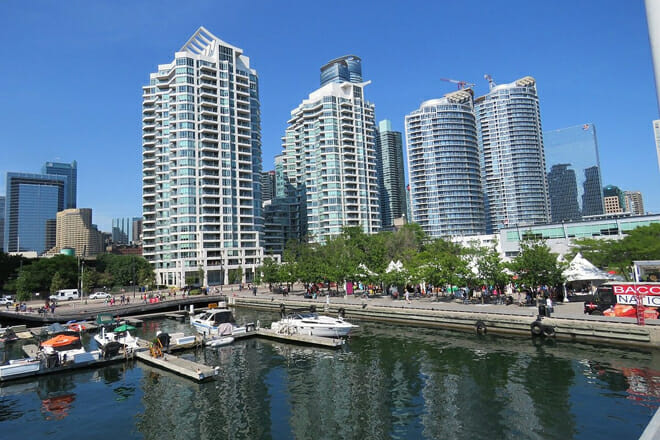
One essential aspect to consider is the health care in Canada for tourists.
Rest assured, Canada has a top-notch healthcare system.
It’s essential to be well-informed and prepared.
While visiting, you will find that healthcare services aren’t always free.
But don’t sweat it.
You can ensure your family’s safety by obtaining travel health insurance before your trip.
Remember that services vary across provinces, so it’s wise to research the region you’re planning to visit.
Your family’s health and safety are the top priority.
So understanding the Canadian healthcare system will be extremely helpful for your adventure.
Now go ahead and enjoy all the incredible experiences Canada has to offer, knowing you’ve got your family’s well-being covered.
Related: Can You Drink Tap Water in Canada?
Frequently Asked Questions
What are the options for medical treatment in canada for tourists.
In Canada, tourists have access to medical treatments ranging from emergency care to walk-in clinics. Hospitals provide emergency services, while walk-in clinics offer non-emergency medical attention. Remember, Canada does not cover medical costs for visitors, so it’s crucial to have travel insurance.
Which Travel Insurance Is Recommended For Visiting Canada?
There isn’t a one-size-fits-all travel insurance plan for visiting Canada. Your choice depends on factors like your trip duration, age, and pre-existing medical conditions. Compare different companies and policies to find the one that best suits your needs.
How Does Health Care Work For New Immigrants In Canada?
New immigrants may be eligible for universal health care in Canada, funded by taxes and provided by each province or territory. However, coverage might not start immediately upon arrival. It’s advised to have temporary private health insurance during any waiting periods.
Do American Tourists Need Additional Insurance When Visiting Canada?
Yes, American tourists visiting Canada should purchase additional travel insurance, as their domestic health insurance may not provide sufficient coverage. It will protect you from any potential financial burdens in unforeseen medical emergencies.
Are Walk-In Clinics Accessible For Visitors In Canada?
Absolutely, walk-in clinics in Canada are available to both residents and visitors. These clinics are a convenient option for non-emergency medical care. Just make sure your travel insurance covers the services provided by the clinic.

You are using an outdated browser. Upgrade your browser today or install Google Chrome Frame to better experience this site.
Medical Tourism: Travel to Another Country for Medical Care

Traveling to another country to get medical care can be risky. Learn about the risks and how to minimize them.
Traveling Internationally for Medical Care
Each year, millions of US residents travel to another country for medical care which is called medical tourism. Medical tourists from the United States most commonly travel to Mexico and Canada, and to several other countries in Central America, South America, and the Caribbean.
The reasons people may seek medical care in another country include:
- Cost: To get a treatment or procedure that may be cheaper in another country
- Culture: To receive care from a clinician who shares the traveler’s culture and language
- Unavailable or unapproved procedures: To get a procedure or therapy that is not available or approved in the United States
The most common procedures that people undergo on medical tourism trips include dental care, cosmetic surgery, fertility treatments, organ and tissue transplantation, and cancer treatment.
Medical Tourism Can Be Risky
The risk of complications depends on the destination, the facility where the procedure is being performed, and whether the traveler is in good health for the procedure(s). Other issues that can increase a traveler’s risk of complications include:
Infectious Diseases. All medical procedures have some risk of infection. Complications from procedures performed in other countries include wound infections, bloodstream infections, donor-derived infections (in the case of transplantations or transfusions), and diseases such as hepatitis B, hepatitis C, and HIV.
Antimicrobial resistance. Highly drug-resistant bacteria and fungi have caused disease outbreaks among medical tourists. Antimicrobial resistance happens when germs develop the ability to not respond to drugs such as antibiotics used to treat infections. Antimicrobial resistance is a global problem. Healthcare facilities in another country may not have adequate infection control practices and medical tourists could be at risk for getting a drug-resistant infection.
Quality of Care. Some countries’ requirements for maintaining licensure, credentialing, and accreditation may also be less than what would be required in the United States. In some countries, counterfeit medicines and lower quality medical devices may be used.
Communication challenges. Communicating with staff at the destination and healthcare facility may be challenging. Receiving care at a facility where you do not speak the language fluently could lead to misunderstandings about your care.
Air Travel. Flying after surgery can increase the risk for blood clots, including deep vein thrombosis . Delaying air travel for 10-14 days following major surgeries, particularly those involving the chest, will minimize risks associated with changes in atmospheric pressure.
Continuity of Care. Travelers may need to get health care in the United States if they develop complications after returning. Follow-up care for complications might be expensive. Treatment might be prolonged and might not be covered by your health insurance.

How You Can Minimize Medical Tourism Risks
Research the clinician and facility.
- Check the qualifications of the clinician who will be doing the procedure and the credentials of the facility where the procedure will be done. Accrediting groups, including Joint Commission International, DNV GL International Accreditation for Hospitals, and the International Society for Quality in Healthcare, have lists of standards that healthcare facilities need to meet to be accredited. Please note that all surgeries carry the risk of complications and accreditation does not guarantee a positive outcome.
- If you go to a country where you do not speak the language, determine ahead of time how you will communicate with your clinician and others who will be caring for you.
Before you travel
- Get a pretravel consultation. See your healthcare provider or a travel medicine clinician at least 4–6 weeks before the trip to discuss general information for healthy travel and learn about specific risks you may face because of your health status, the procedure, and travel before and after the procedure.
- Obtain international travel health insurance that covers medical evacuation back to the United States.
- Find out what activities are not recommended around the time of the medical procedure, such as swimming or hiking, and plan accordingly.
Maintain your health and medical records
- Bring copies of your medical records with you, including results of lab tests and other tests related to your condition and care. Inform the medical staff at your destination of allergies you may have.
- Pack a travel health kit with your prescription and over-the-counter medicines in their original packaging. Bring enough medicine to last your whole trip, plus a little extra in case of delays. Also, bring copies of all your prescriptions and a list of medications you take, including their brand names, generic names, manufacturers, and dosages.
- Get copies of all your medical records from the medical facility at your destination before you return home. You may need to get them translated into English.
Arrange for follow-up care before you travel
- Identify where you will be staying immediately after the procedure.
- Make sure you can get any needed follow-up care in the United States. Follow-up care for medical complications can be expensive and might not be covered by your health insurance. Travelers considering procedures outside the United States should understand the potential financial costs associated with follow-up care or emergency care in the event of complications, review their health insurance policies to determine what, if anything, is covered and plan for the possibility of paying for additional care out-of-pocket.
- Supplemental travel health insurance may also be available to cover follow-up or emergency care from procedures received abroad.
Related Resources
- CDC Yellow Book: Medical Tourism
- American Medical Association Ethical Guidance on Medical Tourism
- Organization for Safety, Asepsis, & Prevention's Traveler’s Guide to Safe Dental Care
- The International Society of Aesthetic Plastic Surgery guidelines for travelers
- International Travel (US Department of State)
- Your Health Abroad (US Department of State)
File Formats Help:
- Adobe PDF file
- Microsoft PowerPoint file
- Microsoft Word file
- Microsoft Excel file
- Audio/Video file
- Apple Quicktime file
- RealPlayer file
- Zip Archive file
Exit Notification / Disclaimer Policy
- The Centers for Disease Control and Prevention (CDC) cannot attest to the accuracy of a non-federal website.
- Linking to a non-federal website does not constitute an endorsement by CDC or any of its employees of the sponsors or the information and products presented on the website.
- You will be subject to the destination website's privacy policy when you follow the link.
- CDC is not responsible for Section 508 compliance (accessibility) on other federal or private website.
DESTINATION

1. Overview
Brief introduction to the country and its reputation in medical tourism.
Canada, known for its stunning landscapes and high standard of living, has been quietly establishing itself as a reputable destination for medical tourism. With a healthcare system that ranks among the world's best, Canada offers medical tourists the promise of high-quality, innovative treatments often at a fraction of the cost found in other developed countries. While the country is primarily famous for its universal healthcare available to residents, medical tourists are increasingly discovering the benefits of seeking medical care in this North American nation.
Historical and Cultural Significance in Medicine
Historically, Canada has made several groundbreaking contributions to the field of medicine. From the discovery of insulin by Frederick Banting and Charles Best in the 1920s to pioneering techniques in cardiac surgery, the country has a rich history of medical research and innovation. Its cultural emphasis on holistic wellness and preventive medicine also creates a nurturing environment for medical tourists seeking not just curative but also preventative treatments.
Why Choose Canada?
Besides its medical achievements, Canada is known for its stringent healthcare regulations, state-of-the-art medical facilities, and highly skilled professionals. The country prides itself on a culturally sensitive and patient-centered approach to healthcare, which is especially beneficial for medical tourists from diverse backgrounds.
Developing Trends
Over recent years, Canada has seen growth in specialty areas such as cosmetic surgery, fertility treatments, orthopedic procedures, and alternative medicine. The rise of telemedicine has also made consultations more accessible for international patients, making Canada an increasingly attractive destination for medical tourism.
2. Popular Medical Procedures
List and brief descriptions of procedures.
Canada is a leader in several medical specialties. Among them:
- Orthopedic Surgery : Including hip and knee replacements.
- Cardiac Care : Advanced procedures like minimally invasive heart surgeries are popular.
- Cosmetic Surgery : From facelifts to liposuction.
- Cancer Treatments : Specializing in cutting-edge therapies.
Specializations or Pioneering Treatments
Canada is recognized for its research and development in the medical field, particularly in stem cell therapies, personalized medicine, and minimally invasive surgical techniques. Certain facilities also offer specialized treatment plans that integrate alternative therapies such as acupuncture and chiropractic care, offering a holistic treatment approach.
3. Top Hospitals & Clinics
Renowned institutions.
Some of the top medical facilities include the Toronto General Hospital, Vancouver General Hospital, and the Mayo Clinic's Canadian affiliate, among others.
Accreditation and Affiliation
Canadian hospitals often hold accreditations from the Healthcare Accreditation Canada (HAC), which ensures they meet international healthcare standards. Many are also affiliated with world-class research universities.
Special Features, Awards, or Recognitions
Many Canadian hospitals have received awards for innovation in medical care and patient services, as well as recognition for their advanced research programs.
4. Cost Comparison
Comparative data.
On average, medical procedures in Canada can cost 30-60% less than in the United States, depending on the treatment. However, costs are generally higher than in countries like India or Thailand.
Price Ranges
For example, a hip replacement may range from $16,000 to $20,000, whereas the same procedure can cost upwards of $30,000 in the United States.
5. Quality & Safety
Medical standards and practices.
Canada adheres to some of the highest medical standards globally, ensuring that medical tourists receive top-tier care. The country's healthcare system operates under stringent guidelines enforced by federal and provincial authorities. State-of-the-art facilities, advanced diagnostic equipment, and a focus on research make Canada a reliable option for healthcare services.
Accreditation Systems, Regulatory Bodies, and Quality Checks
Healthcare Accreditation Canada (HAC) is the primary body overseeing hospital accreditation, ensuring that institutions meet or exceed quality standards. Most hospitals also undergo regular inspections by provincial health departments.
Patient Safety Protocols and Patient Rights
Canadian healthcare facilities are committed to maintaining rigorous patient safety protocols, including infection control, medication safety, and high nurse-to-patient ratios. Patients are also entitled to confidentiality, informed consent, and the right to refuse treatment, aligning with international patient rights standards.
6. Medical Visa Information
Guidelines and requirements.
Canada offers a range of visa options for medical tourists, depending on the duration and purpose of the visit. A Temporary Resident Visa (TRV) is commonly used for short-term medical treatment.
Duration, Documentation Required, and Application Process
Generally, a TRV allows you to stay in Canada for up to six months. Required documentation typically includes identification, proof of medical appointment, financial solvency, and a letter from your healthcare provider. The application process can take several weeks, so it's advisable to plan well in advance.
Travel-Related Advisories or Restrictions
As with any international travel, it's essential to check for any current advisories or restrictions related to health or security.
7. Cultural Considerations
Local customs and etiquette.
Canadians are known for their politeness and welcoming nature. However, punctuality is highly valued, especially for medical appointments. Always arrive on time.
Language and Prevalence in Medical Institutions
While English and French are the official languages, most medical staff are fluent in English. Interpretation services are commonly available in healthcare settings.
Dietary Considerations or Restrictions
Canadian hospitals offer a variety of dietary options, including vegetarian, halal, and kosher meals, catering to a diverse patient population.
8. Travel & Accommodation
Popular areas to stay.
Toronto, Vancouver, and Montreal are popular cities with easy access to top medical facilities. Accommodations range from budget hotels to luxury suites.
Proximity to Medical Facilities
In most major cities, medical facilities are centrally located, making it convenient for patients to travel back and forth.
Transportation Facilities and Infrastructure
Canada has a robust public transportation system. Many cities offer public transit that is accessible to people with disabilities.
Recommendations for Post-Procedure Relaxation
Canada's breathtaking landscapes offer excellent opportunities for post-procedure relaxation, from the serene coasts of British Columbia to the tranquil countryside of Quebec.
9. Legal & Ethical Considerations
Legal rights of patients.
Patients have the right to informed consent, confidentiality, and quality care, among other legal protections under Canadian law.
Medical Malpractice Laws and Patient Recourse
Canada has stringent medical malpractice laws. Patients who believe they've received inadequate care have the right to file a complaint or even pursue legal action.
Ethical Considerations
Canada adheres to global ethical guidelines regarding treatments like stem cell research, organ transplantation, and clinical trials.
10. Benefits & Risks
High-quality healthcare, state-of-the-art facilities, and globally recognized medical professionals make Canada a desirable medical tourism destination.
Potential risks include the cost factor for some patients and the relatively colder climate, which may not be suitable for all medical conditions.
11. Post-Procedure Care
Post-operative care.
Canadian healthcare institutions offer thorough post-operative care, including specialized rehabilitation services and follow-up appointments to monitor recovery.
Availability and Quality of Rehabilitation Centers
Top-notch rehabilitation centers are available, specializing in everything from orthopedic recovery to cardiac rehabilitation.
12. Frequently Asked Questions (FAQs)
- Do Canadian Hospitals Accept International Insurance?
- Some do, but it's best to confirm in advance.
- What is the Typical Wait Time for Procedures?
- This varies by procedure and hospital, so it's advisable to consult directly with the healthcare provider.
- Can Family Members Accompany Me?
- Most Canadian visas allow for accompanying family members, but verify the specifics based on your situation.
- Is Emergency Care Available for Medical Tourists?
- Yes, emergency care is available, although it may be costly without proper insurance.
Global Provider Members

English and French
Canadian Dollar
Because of its great latitudinal extent, Canada has a wide variety of climates. Ocean currents play an important role, with both the warm waters of the Gulf Stream in the Atlantic and the Alaska Current in the Pacific affecting climate. Westerly winds, blowing from the sea to the land, are the prevailing air currents in the Pacific and bring coastal British Columbia heavy precipitation and moderate winter and summer temperatures. Inland, the Great Lakes moderate the weather in both southern Ontario and Quebec. In the east, the cold Labrador Current meets the Gulf Stream along the coast of Newfoundland and Labrador, cooling the air and causing frequent fog.
Facilitators

Ontario, Canada

Manitoba, Canada

British Columbia, Canada

Toronto, Canada
Featured Treatments
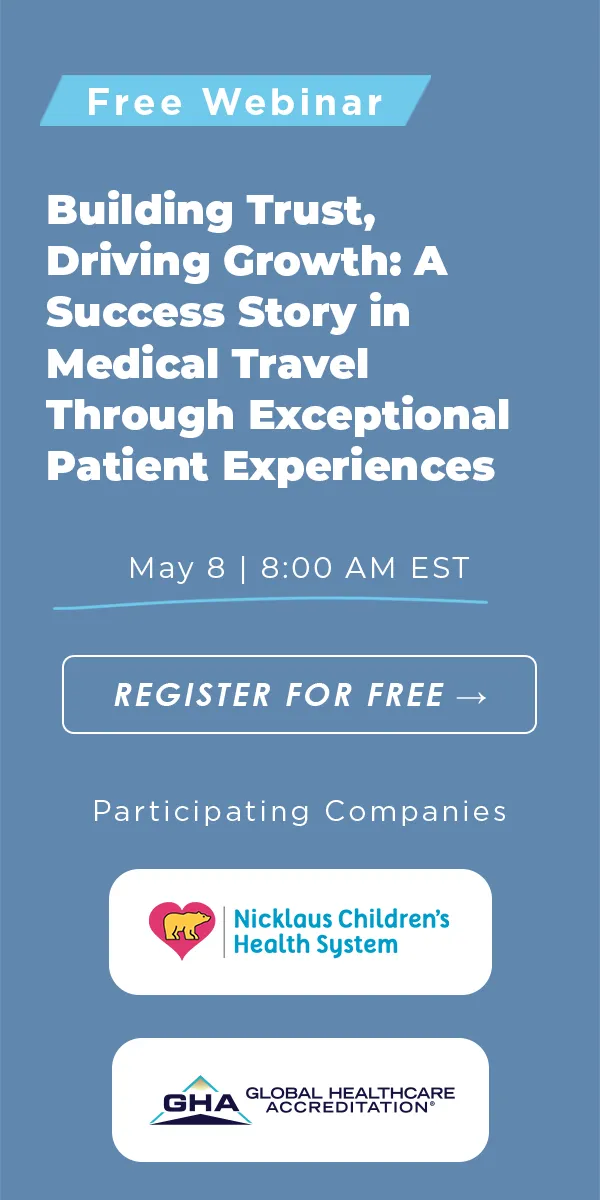
MedicalTourism.com
MedicalTourism.com is a free, confidential, independent resource for patients and industry providers. Our mission is to provide a central portal where patients, medical tourism providers, hospitals, clinics, employers, and insurance companies can all find the information they need. Our site focuses on patients looking for specific knowledge in the fields of medical tourism, dental tourism, and health tourism.
What you need to know about Ontario's changes to the Northern Health Travel Grant
Ontario is spending $45m over three years to expand the program.


Social Sharing
Northern Ontario residents who need to travel to access health care will receive more provincial assistance starting this fall.
The Ontario government is spending $45 million over three years to expand the Northern Health Travel Grant. While the expansion was initially included in the 2024 Ontario budget, Ontario Health Minister and Deputy Premier Sylvia Jones held a news conference in Thunder Bay on Tuesday to provide further details.
The changes to the program include:
- The introduction of an online application process that includes digital receipt submissions for faster reimbursement;
- Adding more eligible health care providers and facility locations;
- Increasing the accommodation allowance from $100 to $175 per night;
- Reducing the travel distance requirement to be eligible for the overnight accommodation allowance from 200 km to 100 km, and
- Increasing the total allowance for eight or more nights from $550 to $1,150.
A full list of changes can be found on the Ontario website .
"We know that for too long patients in northern Ontario have faced unique challenges when accessing healthcare," Jones said during a visit to the Thunder Bay Regional Health Sciences Centre (TBRHSC) on Tuesday morning. "Our investments to expand and enhance the Northern Health Travel Grant will ensure more people in northern Ontario can connect to the specialized care they need when they need it."
Jones added, however, that the grant is "one piece" of the provincial health care system, and said the province is working to increase the system's capacity province-wide.
"Fifty hospitals are, right now, in the process of being built new, renovated or expanded," Jones said. "That is a capital piece that ensures that we will have over 3,000 more hospital beds across Ontario."
"When we do that, of course, we need more health human resources," she said. "So we are expanding and we have expanded access to school in northern Ontario, southern Ontario."
"I'm particularly proud of the Northern Ontario School of Medicine. We've had over 100 new seats available for physicians who want to train in northern Ontario, and 60 per cent of those are for primary care family docs. We know that when people train in communities, they tend to stay in those communities."

How this med school is tackling the rural doctor shortage
Paul Carr, a patient family advisor with TBRHSC, said people in the region can face barriers when it comes to accessing the care they need.
"It would be great if patients could access the same level of care and services throughout the province, but we know this is not the case right now," he said. "Some of our patients have to travel to access care, and this can be a daunting experience for some."
- Ontario deficit will triple as economy weakens, 2024 budget shows
- What you need to know about Ontario's 2024 budget
"It may be the first time they've ever traveled to an urban centre, and of course it can be expensive," Carr said. "This can be a deterrent to accessing care, as well as an added burden during a very stressful time for both patients and families."
"Many patients rely on the Northern Health Travel Grant program to help provide financial assistance."
In a media release, the province said about 66,000 northern Ontario residents made use of the grant program in 2022-23.
Related Stories
External links.
- 2024 Ontario budget
For Members
Find a plan, advice center, common questions, visitors to canada.
Emergency health coverage for tourists, workers, new immigrants and students.
Buy Now Make a Claim

Be ready for Canada
Arriving in a new country can be as daunting as it is exciting. To prevent any unnecessary anxiety, Pacific Blue Cross offers a Visitors to Canada Travel plan to ensure that your stay here is worry-free.
Our Visitors to Canada Travel plan provides protection against the high cost of emergency medical care for foreign visitors entering Canada for pleasure or business reasons, for foreign students, for immigrants or foreign workers entering Canada to lawfully seek permanent residence.
When this coverage is purchased prior to arrival in Canada, coverage becomes effective on the day you arrive. The plan is also available for purchase within 30 days of arrival, and coverage commences 72 hours following the date of application.
For returning Canadians awaiting eligibility for the Government health insurance plan to begin.
Pacific Blue Cross has you covered.
What coverage is available?
When Visitors to Canada coverage is purchased prior to arrival in Canada, coverage becomes effective on the day you arrive. The plan is also available for purchase within 30 days of arrival, and coverage commences 72 hours following the date of application.
Our Visitors to Canada travel plan covers costs related to emergency medical care resulting from an accident or sudden illness. The plan pays for expenses necessary for the stabilization of the medical condition that are over and above any benefits granted by the government programs of the person's country of residence.
Plan Highlights:
Hospitalization, medical and paramedical expenses.
- Hospitalization: Hospitalization expenses for ward accommodation. Semiprivate or private accommodation are not covered.
- Physician fees: The medical and surgical charges for the services of a physician, surgeon or anesthetist, up to the amount payable under the government fee schedule in the area where services are rendered.
- Medical appliances: The purchase or rental cost of crutches, canes or splints, and the rental cost of wheelchairs, orthopedic corsets and other medical appliances when prescribed by the attending physician.
- The fees of a registered nurse (other than a relative) for private care while hospitalized and when medically necessary and prescribed by the attending physician.
- Diagnostic services: The charges for laboratory tests and x-rays when prescribed by the attending physician.
- Drugs (when required as part of emergency treatment): The cost of drugs requiring a physician's prescription, except when they are required for the continued stabilization of a chronic medical condition.
- Accidental Dental Care: The fees of dental surgeons for treatment necessitated by an external injury (not as a result of deliberate introduction of food or an object into the mouth), only when natural and healthy teeth, which have had no previous treatment, are damaged, or to reduce a fracture or dislocation of the jaw.
Transportation Expenses
The following services must be approved and planned by Medi-Assist.
- Ambulance service: We cover the cost of local ambulance or air ambulance service to the nearest accredited medical facility, including inter-Hospital transfer when the attending physician and Medi-Assist determine that existing facilities are inadequate to treat or stabilize the patient's condition.
- Repatriation to the residence: Covers the cost of repatriation to your country of residence by means of appropriate transportation in order to receive immediate medical attention, following the authorization of the attending physician and Medi-Assist.
- Return of the vehicle: We;ll cover the cost of returning a your vehicle, either private or rental, by a commercial agency or by any person authorized by Medi-Assist to your residence or nearest appropriate vehicle rental agency, when you are unable to return the vehicle due to Illness or accident.
- Return of the deceased: The plan pays up to $5,000 for the cost of preparation and transportation of the deceased person (excluding the cost of a coffin) to the place of residence, or up to $3,000 for the cost of cremation or burial at the place of death.
- Subsistence allowance: Covers up to $1,000 ($100 per day for a maximum of 10 days) for the cost of accommodation and meals in a commercial establishment, when a Covered person's return must be delayed due to Illness or bodily injury to himself or to an accompanying Member of the immediate family of the Covered person or Traveling companion.
Failure to contact Medi-Assist in the event of medical consultation or hospitalization following an accident or sudden Illness could result in refusal of the compensation requested.
Call us if an emergency strikes
Medi-Assist is our 24/7 medical travel assistance line that will help you locate medical care, provide advisory services, refer you to interpreters, assist with transportation, contact relatives and more. It means you can focus on getting healthy and leave it to us to manage your care while in an unfamiliar environment.
If you do experience an unexpected emergency while travelling, we are here to help.
During your trip, you can call our Medi-Assist service to determine your level of coverage and receive help:
- In Canada or the U.S., call toll-free: 1-888-699-9333
- Outside of Canada or the U.S. or where toll-free is unavailable, please call collect to 1-604-419-4487 and we will pay for the call.
Claims Process
Out-of-Province Emergency Medical Claims — Four simple steps
Trip Cancellation / Baggage Claim Form — Form for claiming Trip Cancellations or Lost Baggage [pdf]
Visitors to Canada Travel Plan Claim Form — Form for claiming against a Visitors to Canada Travel Plan contract [pdf]
CoverMe ® travel insurance for visitors to Canada
On this page.
Instruction: Change of selection promptly shifts the focus to a matching heading further down, on the same page.
Help cover emergency medical expenses while visiting Canada
Canada has lots to offer, including free health care but only for its residents. When you or your loved ones visit Canada, emergency medical expenses could leave you burdened with hefty bills. With Manulife CoverMe Travel Insurance for Visitors to Canada, you can get help covering unexpected medical expenses such as prescription drugs, dental, hospital, and healthcare practitioner services, so you don’t end up paying out-of-pocket.
Travel plans for Visitors to Canada
All plans meet the requirement of super visa for parents and grandparents.
This plan helps protect you from emergency medical expenses, so you can focus on experiencing Canada.
- Covers up to the limit you select up to CAD $200K
- No medical questionnaires required
- No coverage for pre-existing medical conditions
- No age limit
Get help with covering the cost for medical emergencies in Canada —even with some pre-existing medical conditions.
- Coverage for pre-existing medical conditions that did not exist within 180 days prior to the effective date 1
- Includes dental, and accident death and dismemberment coverage
- Apply up to age 85
Our most comprehensive plan to help you from emergency medical costs, even if you have a stable pre-existing medical condition.
- Coverage for pre-existing medical conditions that have been stable 2 for at least 180 days
- Includes dental, and accident death and dismemberment benefits
Download a detailed comparison chart for visitors to Canada (opens PDF)
Why Manulife
Our Visitors to Canada travel plans are comprehensive and flexible – all have the following benefits:
- Access to Manulife’s Travel Assistance 24/7 – 365 days a year
- Receive a full refund if your plans change or get cancelled before the effective date
- Side trips are covered when you travel to another destination from Canada 3
Ready to buy?
You can get a quote and purchase Manulife travel insurance online through Manulife CoverMe.
Visitors to Canada travel insurance is highly recommended to prevent you from paying out-of-pocket for expensive health care services in case of a health emergency. Purchasing visitors to Canada travel insurance is mandatory if you are applying for super visa for parents and grandparents.
It is best to purchase visitor to Canada insurance before your arrival. This is because if you purchase the insurance after you arrive, there is a waiting period. A waiting period is an amount of time that you need to wait after purchase or after your arrival in Canada before you’re covered.
Need assistance?
Want to talk through your options.
Have questions and want to speak to a licensed insurance advisor? We can help with that!
Submit a travel claim
Visit our dedicated travel portal to start a claim. First-time on the site? Simply register, activate your account, and sign in.
Explore other travel insurance products
Travel insurance for travelling canadians.
Explore out-of-province or country with less worry with coverage for emergency medical, flight cancellations and delays, and more.
Travel Insurance for Students
Get help with medical expenses when studying away from home – either in Canada or abroad.
1 No coverage is provided for pre-existing medical conditions that existed within 180 days prior to the effective date. For example, if your travel date and policy effective date is June 30 th , then any pre-existing medical conditions that existed between January 1 st and June 30 th are not covered.
2 A pre-existing medical condition is considered stable when all of the following statements are true:
- There has not been any new treatment prescribed or recommended, or change(s) to existing treatment (including a stoppage in treatment), and
- There has not been any change in medication, or any recommendation or starting of a new prescription drug, and
- The medical condition has not become worse, and
- There has not been any new, more frequent or more severe symptoms, and
- There has been no hospitalization or referral to a specialist, and
- There have not been any tests, investigation or treatment recommended, but not yet complete, nor any outstanding test results, and
- There is no planned or pending treatment.
3 A side trip is any trip taken to other countries from Canada (starts and ends in Canada) during the duration of your policy. Side trips do not cover your country of origin. Side trips must not exceed the lesser of 30 days/policy or 49% of the total number of coverage days in your policy.
- Skip to main content
- Skip to site information
Language selection
Help us to improve our website. Take our survey !
Travelling outside Canada to receive medical care
This information is for people planning to travel outside Canada to have a medical procedure.
If you’re travelling for other reasons and have a medical emergency, consult the following:
If you become sick or injured while travelling outside Canada or after your return
On this page
Medical tourism, health risks, financial risks.
- Planning your procedure
During travel
Returning home.
Medical tourism is the term used when travellers go to another country for medical treatment. This can be for surgical and medical treatments or procedures, including cosmetic and dental.
You may choose to go to other countries for reasons such as:
- lower costs for treatment
- quicker access to medical services
- medical care not available in Canada
- recommendations from friends and family
- preference to receive care from a culturally similar provider
- opportunity to combine medical care with vacation destination
While most procedures go as planned, there can be serious complications. If you choose medical tourism, discuss your plans with a travel health clinic or your health care provider in Canada first.
You should also:
- only use trusted health care providers
- research the facility where the procedure will take place
- buy comprehensive health insurance that covers medical procedures in other countries
- Travel insurance
All medical and surgical procedures involve some risk to the patient. These risks may be higher in hospitals outside Canada, depending on where you choose to travel.
General complications
There have been reports of serious illness or complications from medical care received in health care facilities outside of Canada. These can include bacterial infections that are resistant to antibiotics.
If you become ill after your procedure, health care providers in Canada may not have enough information to properly assess and treat you.
Language barriers can also lead to misunderstandings about your medical care, including proper aftercare.
Flying soon after surgery may also increase your risk of complications, including:
- blood clots in the legs
- blood clots in the lungs
- air becoming trapped in a blood vessel post operation
Different standards and risk of infection
Hospital or medical clinic accreditation standards may be different from those in Canada.
Licensing standards may differ for:
- pharmacists
Some countries use different standards for regulating drugs.
Medication outside of Canada may be:
- counterfeit
- poor quality
- outdated or damaged
- unsafe, toxic or untested
- ineffective or watered down
Infection prevention and control procedures in medical facilities may also be different, which could lead to a higher risk of complications.
Standards for screening blood products or sterilizing medical equipment may be different than in Canada.
This could increase your risk of infections like:
- hepatitis B
- hepatitis C
- drug-resistant infections
Safety concerns
You may be pressured into undergoing procedures you don’t fully understand or consent to. If something goes wrong, your options for legal action may be limited.
Some international businesses pay people from developing countries to donate their organs. Organs may also be harvested from vulnerable people (like prisoners) without their consent. As such, the safety of these organs or the surgical procedures used to transplant them may not meet Canadian standards.
You may be seeking treatment outside of Canada to save money. However, complications or unplanned aftercare could result in greater costs to you than having the same procedure in Canada.
Your provincial or territorial health plan may not cover your expenses if you develop complications in the country where you’re having the procedure. Most travel insurance policies also won’t cover planned medical procedures in another country.
Learn more about:
Planning for your procedure
When planning your procedure, be wary of:
- people pressuring you into making a quick decision
- this includes claims that the procedure is of lower risk than what’s reported in Canada
- companies selling packages that include a holiday as well as the treatment
You should also be cautious if:
- there’s little information about the health care team available
- you have no opportunity to consult the physician before treatment
Talk to a health care provider in Canada
Before you decide to have a medical procedure done in another country, talk to a health care provider in Canada.
You should discuss if:
- you’re healthy enough to travel
- air travel is a risk after the procedure
- your routine vaccinations are up to date
- you need any other vaccinations before you travel
- any ongoing medical conditions are well controlled and stable
- you have enough required medication for the length of your trip
You should also talk about:
- whether you’ll need a follow-up consultation
- making a medical recovery plan when you return to Canada
Even if you don’t discuss it with a health care provider, you should make a plan for your aftercare in Canada.
- Travel vaccinations
Consult with the health care provider who will do your procedure at your destination to discuss the specific risks. Find out what legal rights you have if something goes wrong.
Check the credentials of anyone who will be providing medical care. Most countries publish this information on an official government website.
Research the facility where your procedure will be performed. Do not go to an unofficial medical facility. Find out whether the facility is accredited by the country’s state or federal body responsible for regulating health care.
Calculate all costs, including for emergencies. For example, an unexpected medical evacuation back to Canada if a procedure goes wrong or there are complications.
Read the travel advice and advisories for your destination to find out:
- about health risks
- advice to protect your health
- about medical services and facilities
Travel advice and advisories
Preparing to travel
Get written agreements with the health care providers or medical tourism group arranging your trip that fully outline what your fees cover, including:
Bring copies of your medical records, including:
- known allergies
- pre-existing conditions
- generic name
- manufacturer
You may need to have your records translated into another language before you go.
- pack essential items in a travel health kit
- consult with your airline about rules for travelling after a medical procedure
- plan how you’ll communicate with your health care providers if you don’t speak their language
Travel health kit
When you arrive:
- ask to see the clinic or hospital where the treatment will take place
- have a medical consultation before your procedure
- check that your health care provider has prescribed you with appropriate medication, including pain relief
If you have any concerns, do not proceed with the treatment.
Get copies of all medical records related to your procedure before departure, including X-rays and scans. This is important for follow-up care and if there are complications after you return home.
Review everything with a health care provider when you return to Canada, including:
- the results of medical tests
- descriptions of the procedures you had
- information about the medications you received
You may need to translate this information into English or French.
Monitor your health, especially if you have a chronic illness.
This includes conditions such as:
- respiratory disease
- cardiovascular disease
See a health care provider immediately if you notice any changes in your condition or signs of infection after you return, such as:
- swelling at the surgical site
If you had injections or blood transfusions while you were in another country, discuss blood testing with a health care provider. A test will look for infections transmitted by blood.
Tell any health care provider you consult for at least 12 months after you return that you have received medical treatment outside of Canada.
Related links
- Well on Your Way: A Canadian’s Guide to Healthy Travel Abroad
- Travel health information
Other resources
- Transplant tourism (BC Renal)
- Declaration of Istanbul on organ trafficking and transplant tourism (International Society of Nephrology)
- Travelling for treatment: Medical tourism (Travel Health Pro)
- Medical tourism: Travel to another country for medical care (U.S. Centers for Disease Control and Prevention)
Visitors to Canada Insurance
Emergency medical coverage and more.
Visit, work or study in Canada—with emergency medical and dental insurance for up to a year.
Get a Quote
Essential coverage for visitors, visitors plan iii.
Ages: 1 month to 69 years
- Up to $150,000 Disclaimer 1 in emergency medical/dental
- 24-hour worldwide emergency medical assistance
- No deductible payment required for claims
See More See Less
- No medical questions asked
- Coverage for a single trip lasting up to 365 days
- Coverage for travel accidents Disclaimer 2
Policy Documents:
For complete coverage details, limitations and exclusions, see:
- Visitors to Canada Plan Opens PDF in new window
Compare Plan Details
Visitors Plan II
Ages: 1 month to 84 years
- Up to $50,000 Disclaimer 1 in emergency medical/dental
- Low $50 deductible payment required for claims
Visitors Plan I
- Up to $25,000 Disclaimer 1 in emergency medical/dental
Make sure you have the right travel insurance—get an online quote or talk to a licensed insurance advisor.
View Legal Disclaimers Hide Legal Disclaimers
PolicyAdvisor LIVE 1-888-601-9980
- Life Insurance
- Mortgage Protection
- Critical Illness
Home / Travel Insurance / Learning Center /
- Can visitors to Canada get health insurance?
Visitors to Canada can get travel medical insurance if they need emergency healthcare while they’re in Canada. This isn’t the same as health insurance, which usually only covers you in your home country. Emergency travel medical can cover things like doctor’s visits and other urgent health care needs for people visiting Canada.

What does travel medical insurance cover for visitors to Canada?
- Does travel health insurance cover families visiting Canada?
- How much does Canadian medical insurance for visitors cost?
How much health insurance coverage can visitors to Canada get?
Why should you buy travel health insurance when visiting canada, how to get the best medical insurance for visitors to canada.
- FAQs about travel medical insurance
When people think of Canada, they usually think of three things: maple syrup, hockey, and “free” healthcare. Visitors to Canada can enjoy two of these, but free government healthcare coverage is not one of them. Instead, travellers will need to explore other options, such as travel insurance , that will cover their healthcare needs while in Canada.
In this article, we’ll answer all of your questions about what kind of insurance visitors to Canada can get, and what they can be covered for.

Need insurance answers now?
Call 1-888-601-9980 to speak to our licensed advisors right away, or book some time with them below.
Can visitors to Canada get medical insurance?
If you come to visit Canada, you cannot use the Canadian government health insurance plan or buy Canadian health insurance plan coverage for yourself.
Instead, a travel insurance plan that covers medical costs is the best options for tourists, visitors , and non-residents to Canada. Travel medical insurance for visitors to Canada can help pay for emergency care if something happens while you’re here.
What is travel insurance?
Travel insurance is a type of insurance that helps to cover the cost of medical care if you become sick or injured while travelling. It can also protect you from financial loss if you have to cancel or interrupt your trip. Different types of travel insurance can cover unexpected costs related to:
Travel plans can cover single or multiple trips . Check your policy for details on exactly what you’re covered for. Or speak with our travel insurance specialists to make sure you have the travel protection you need.
Is there a special type of tourist insurance in Canada?
Most tourists in Canada stay for less than six months, so they can be covered under regular travel insurance for people on a visitor visa. The only exception is super visa insurance , which is for a special type of Canadian visitor. Super visas are only for the parents and/or grandparents of a Canadian citizen or permanent resident.
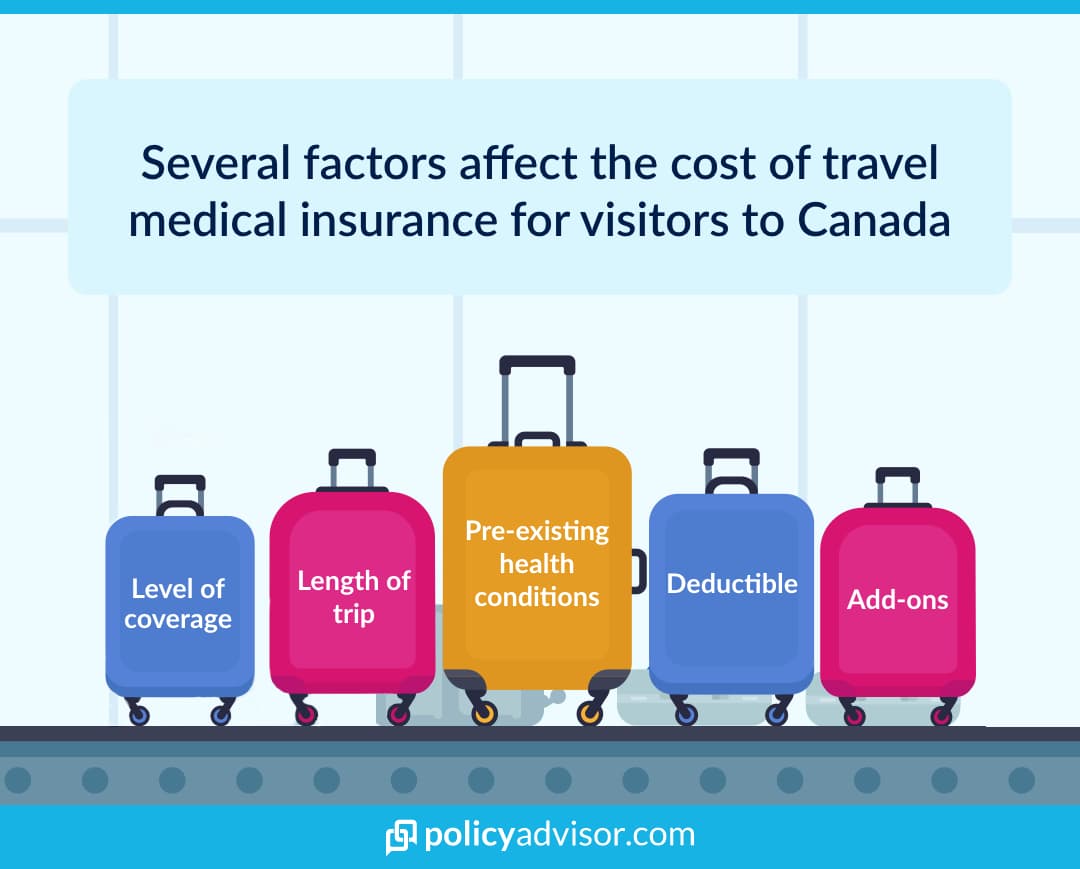
Most travel medical plans will cover:
- Emergency medical treatment for illness or injury
- Prescription medications
- Emergency dental services
- Essential medical equipment (crutches, wheelchairs, slings, braces, etc.)
- X-rays and other diagnostic laboratory procedures (bloodwork, ultrasounds, etc)
- Required ground, air or sea ambulance services
- Follow-up post-medical appointments
- Medical evacuation
- Ambulance travel to the nearest hospital
Keep in mind that what’s covered depends on your insurance company and what plan you sign up for. Some insurance policies cover certain things, while others may not.
Does visitors health insurance cover pre-existing medical conditions?
No, most visitor visa insurance plans won’t pay for a health problem that you already had before you got the insurance. This health problem is considered a “ pre-existing condition .”
Some common pre-existing conditions include:
- Heart disease
- High blood pressure
- Sleep apnea
- Anxiety and/or depression
- Bipolar disorder
- Other mental health conditions
However, if your medical condition is stable, then some insurance companies will cover related complications at an additional cost. The table below shows the criteria for a condition to be considered stable.
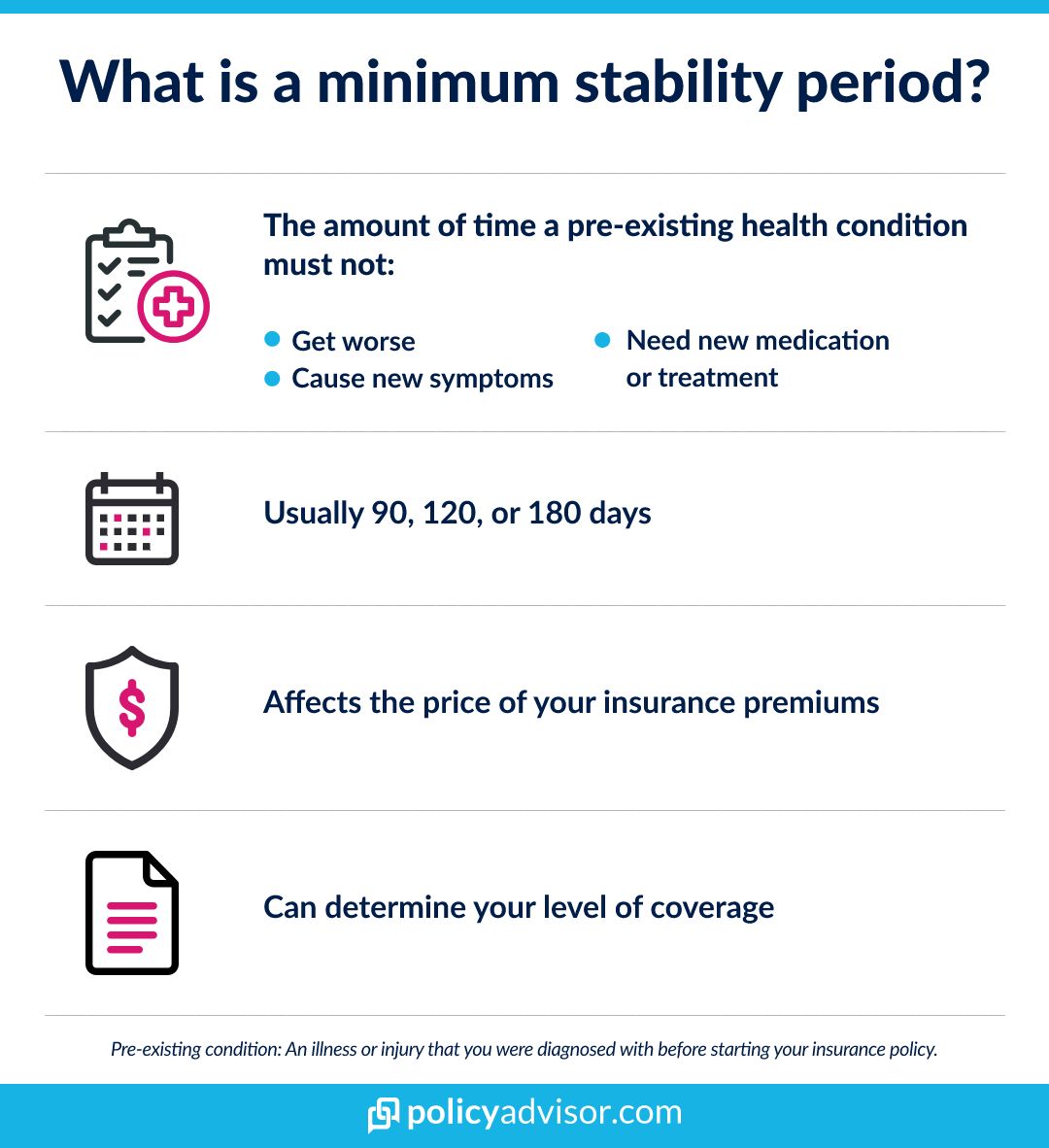
Does travel medical insurance cover families visiting Canada?
Yes, visitors health insurance can cover a family visiting Canada. If you need to cover more than one person at a time, you can get a family policy that will include everyone. But note that there are rules about who can be included in that policy.
Generally, anyone travelling with you will fall under one of two categories:
1 Dependents
- Your spouse
- Your minor children
- Anyone legally or financially dependent on you
Anyone who falls into one of these categories can be included in your travel insurance plan.
2 Non-dependents

Travel Insurance Tip
If you’re not sure about who can be included in your visitors health insurance plan coverage, check your policy wording or speak with one of our travel insurance specialists to find out.
How much does Canadian medical insurance for visitors cost?
The price of Canadian medical insurance for visitors changes depending on things like how long your trip is, how much you’re covered for, if you have any health concerns , and more.
The chart below shows some sample costs for $100K of travel medical insurance coverage, covering covers a seven-day trip to Canada, with a $1,000 deductible.
*A single-trip, 7-day day travel medical insurance policy with $100,000 in coverage and a $1,000 deductible.
What is a travel insurance deductible?
Most travel insurance policies have something called a deductible . It’s the amount of cash you choose to pay out of pocket before your insurance coverage kicks in and covers the rest of the medical bill.
Deductible options also change how much you pay for your policy. The higher the deductible, the cheaper the policy.
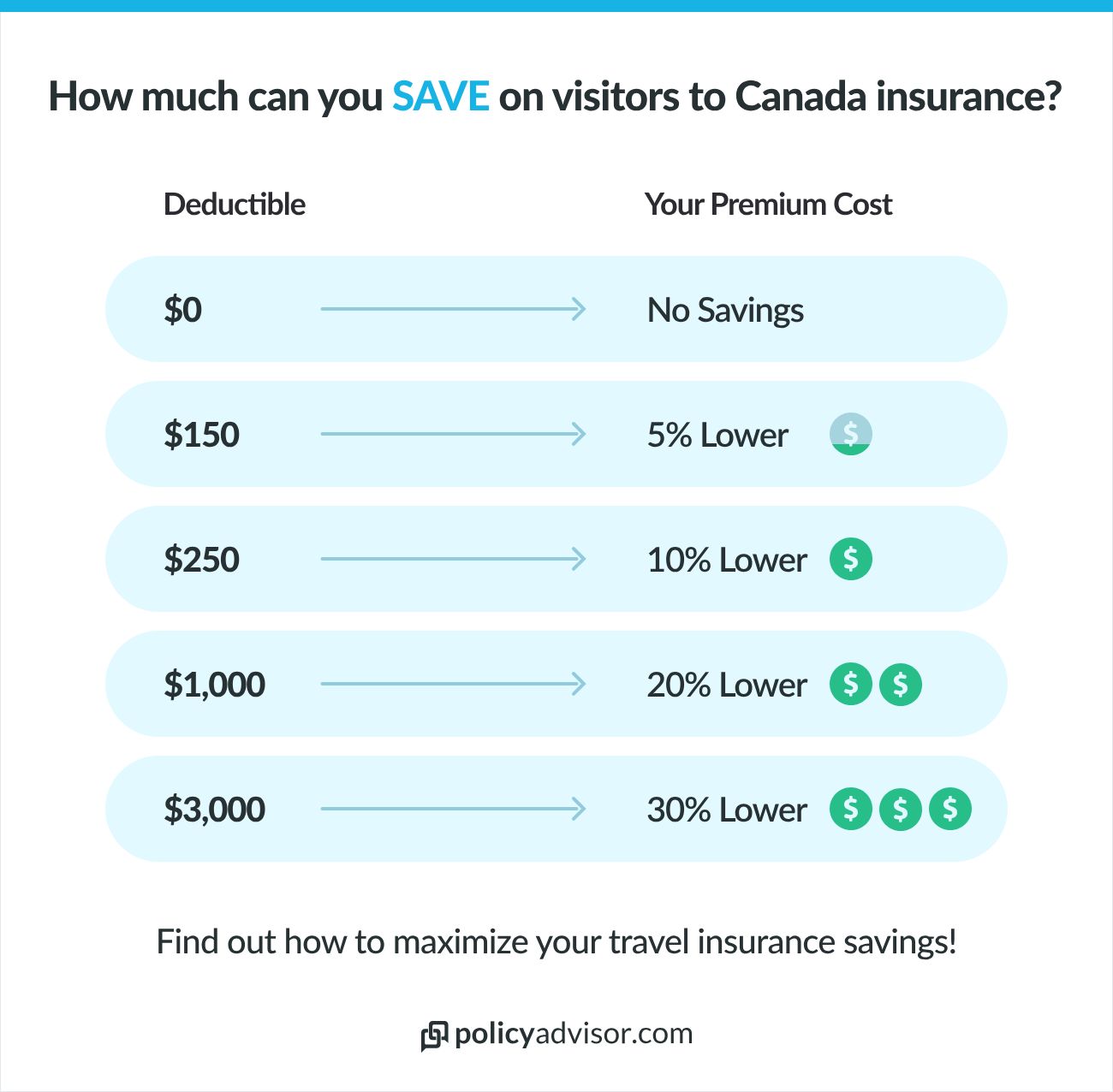
Some deductibles start at zero, meaning you don’t have to pay anything upfront when you have a medical bill—the insurance covers the cost right away. But lower deductible options mean you pay more for your insurance premiums.
Deductibles can also be as high as thousands of dollars, meaning you pay those thousands before insurance helps with the rest. But higher deductible amounts also mean you pay less for your insurance policy.

Tourists and other visitors in Canada can get coverage amounts of $10,000 to $1 million in health insurance coverage for their trip. Most Canadian visitors choose $100K in coverage.
Insurance companies will cover up to a certain dollar amount in unexpected medical costs. How much they cover depends on what kind of medical procedure it is.
The chart below gives you an idea of how much is usually covered for some common healthcare.
A typical travel medical insurance policy for a visitor could cover:

Travel health insurance can help protect tourists against enormous fees if they need to see a doctor or get medical care during their trip to Canada.
Everyone wants to kick back and have a great time on vacation. But a sudden emergency can cost you thousands of dollars per day in medical expenses. Remember, visitors aren’t covered by Canada’s healthcare. And your home country’s health insurance won’t cover you in foreign countries either.
Visitors medical coverage can help pay some of those costs and give you peace of mind knowing you’re financially covered if anything happens.
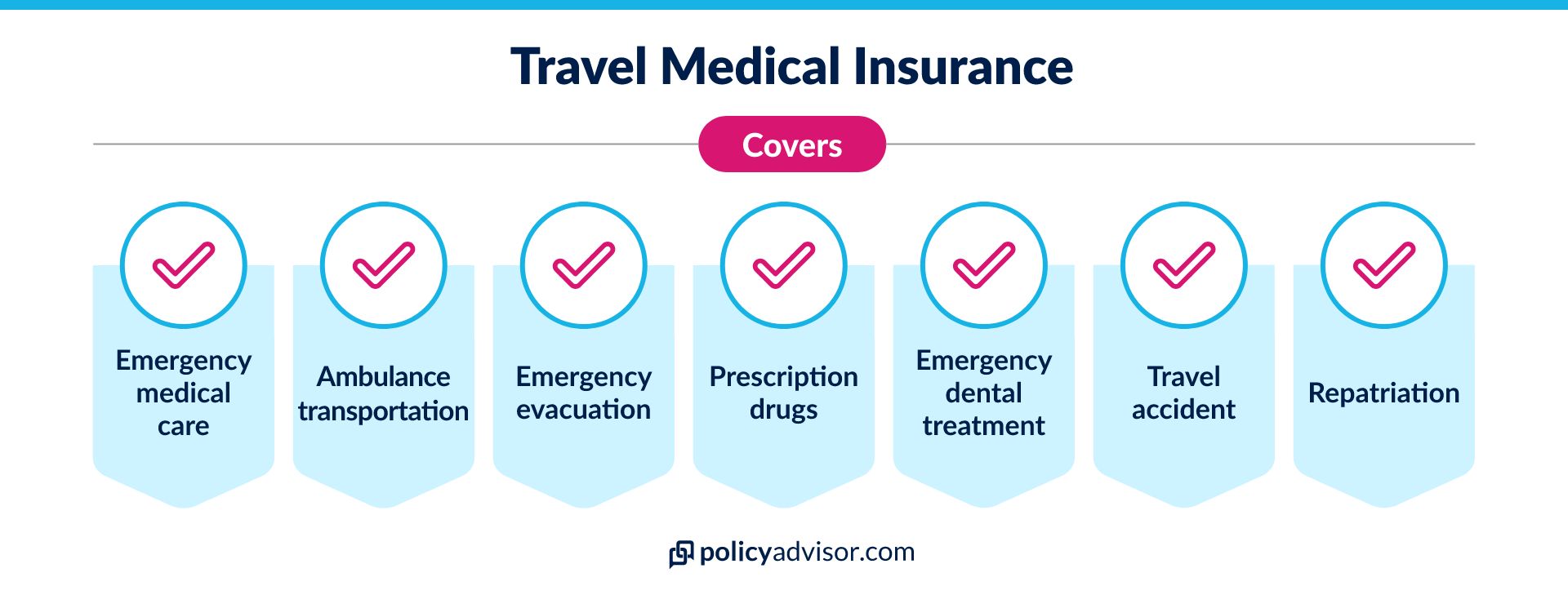
The best way to get health insurance for your trip to Canada is to shop around and compare deals. And you can easily do that right here on PolicyAdvisor.com .
We work with dozens of Canada’s most trusted insurance companies to scan the market for you and find the best prices and coverage based on your needs. Compare your options for free online with our quoting tool. Or take advantage of a free phone consultation with one of our travel insurance specialists who can review coverage options and help you figure out what plan would work best for you and your family.
Which Canadian providers offer emergency medical insurance for visitors to Canada?
You can get visitors health insurance from top Canadian providers like:
- 21st Century
- Allianz Global Assistance
- Destination Canada
- GMS (Group Medical Services)
We work with all of these travel insurance providers and more to bring you the best visitors insurance options. Save time and find the lowest rates in minutes by comparing them on PolicyAdvisor.com .
⚠️ IMPORTANT ⚠️
Remember, the best travel coverage needs to be secured before you arrive in Canada so that it can start in time. Don’t wait to protect your upcoming travel to Canada today!
There are tons of benefits to non-residents getting Canadian health insurance, whether they are tourists or long-term visitors on a super visa. Now that you know how it works, get started on securing your trip today.
Frequently asked questions
Can i buy canadian medical insurance for parents visiting canada .
Yes, you absolutely can buy medical insurance for parents visiting Canada . In fact, this is very common! Many Canadians started out as immigrants to the country, so they may have parents and other family come to visit them sometimes.
There are generally two options for insurance coverage for visiting parents:
1 Visitors insurance
2 Super visa insurance
To buy medical insurance for your visiting parents, or anyone else coming to visit you, you’ll need their:
Can I get a refund for Canadian visitors medical insurance?
Yes, you can get a refund for visitors insurance , but only in cases such as:
- Your trip was cancelled
- Your Canadian visitors visa was denied
- You got a Canadian government health insurance plan
You shouldn’t cancel your travel insurance if you’re still coming to Canada and do not have coverage. Travel insurance can save you from having to spend thousands out-of-pocket in an emergency. It’s well worth the low cost!
What are emergency transportation expenses?
In this article, we referred to emergency transportation expenses. This includes health care costs while you are either living or deceased.
- Ambulance services Ground or air ambulance service to the nearest hospital or medical facility.
- Repatriation Returning you to your country of residence when you are injured or ill so that you can recover in your home country.
- Return of the deceased Returning a deceased person’s remains to the country they lived in. Some policies will also cover the cost of cremation or burial at the place of death.
Even if the airline isn’t forthcoming in this situation, a comprehensive travel insurance plan will have your back!
- Visitors to Canada can get health insurance coverage through a travel medical insurance plan
- Travel medical insurance can cover doctor's visits, hospital stays, emergency transportation, and prescription medication
- Visitors health insurance can cover an individual or a family
Find this informative? Share it with someone you care about.
The information above is intended for informational purposes only and is based on PolicyAdvisor’s own views, which are subject to change without notice. This content is not intended and should not be construed to constitute financial or legal advice. PolicyAdvisor accepts no responsibility for the outcome of people choosing to act on the information contained on this website. PolicyAdvisor makes every effort to include updated, accurate information. The above content may not include all terms, conditions, limitations, exclusions, termination, and other provisions of the policies described, some of which may be material to the policy selection. Please refer to the actual policy documents for complete details. In case of any discrepancy, the language in the actual policy documents will prevail. All rights reserved.
If something in this article needs to be corrected, updated, or removed, let us know. Email [email protected] .
Want more like this in your inbox? Subscribe to our newsletter.
© PolicyAdvisor Brokerage (PAB) Inc., is an insurance brokerage licensed to sell life insurance products in Ontario, British Columbia, Alberta and Manitoba. Not available in other provinces. Policy obligations are the sole responsibility of the issuing insurance company. Issuance of coverage is subject to underwriting by the respective insurance company. Please see policy documents for full terms, conditions, and exclusions. The logos and trademarks used here are owned by the respective entities. Refer to our Privacy Policy and Terms of Service sections for additional information.

HelloSafe » Travel Insurance » health
What is Canada's best travel health insurance (2024)?
verified information

Information verified by Alexandre Desoutter
Our articles are written by experts in their fields (finance, trading, insurance etc.) whose signatures you will see at the beginning and at the end of each article. They are also systematically reviewed and corrected before each publication, and updated regularly.

After saving for the trip you've long dreamed of, picture yourself strolling through the enchanting streets of a foreign city, when suddenly, a medical emergency pops up. It's a scenario none of us want to picture, but it can happen to any of us.
That's where travel health insurance comes in. Travel health insurance or travel medical insurance covers medical expenses, emergency medical evacuation, trip cancellations/interruptions , and related unforeseen events while traveling. But how do you get the perfect policy?
We take you through the best travel health insurance policies from top Canadian providers, and their pros and cons. You can use our comparator to compare multiple travel health insurances and get free personalized quotes so you can pick a policy that truly suits you best.
Best travel health insurance Canada plans
- CAA Travel Health Insurance: Unmatched 24/7 Virtual Emergency Medical Assistance
- RBC Travel Health Insurance: Direct Payment of Emergency Bills for Ultimate Convenience
- Blue Cross Travel Health Insurance: Limited Pre-Existing Condition Requirements
- Manulife Travel Health Insurance: Specialized Packages for Students, Traveling Canadians
- TD Travel Health Insurance: Up to $5 Million Medical Coverage for Added Security
Our top 5 travel health insurance plans for 2024
Caa travel health insurance canada: unmatched 24/7 virtual emergency medical assistance.
With over 115 years of experience, CAA has been a trusted source for Canadians' safety, mobility, and protection. They are known to advocate for road safety, offer diverse services like Roadside Assistance, and CAA travel health insurance , and serve over two million Members in South Central Ontario and Manitoba.
CAA provides both Single Trip and Multi-Trip Annual travel medical insurance with coverage of up to $5 million for medical repatriation, medical and dental emergencies and Covid-19-related medical care . There is also a single-trip medical Canada plan to protect you while traveling across the country.
Let’s look at some of the pros and cons of their policies overall.
Pros of CAA travel health insurance
- Multiple vacation packages ranging from a single trip to multi-trip travels
- CAA health insurance travel coverage up to $100,000
- 24/7 virtual emergency medical assistance is available
- Access to a vast network of healthcare providers
Cons of CAA travel health insurance
- Medical Questionnaire required for travelers above 60 years of age
- Coverage might include limitations with a maximum of 4-30 days per trip
RBC Travel Health Insurance Canada: Direct Payment of Emergency Bills for Ultimate Convenience
As the insurance arm of Royal Bank of Canada (RBC), one of the world's largest banks, RBC provides diverse solutions, serving individuals, businesses, and groups in areas like life, home, auto, RBC travel health insurance , and more.
RBC offers a range of travel medical insurance plans to suit various needs. The Classic Medical Plan provides unlimited emergency medical coverage, direct payment of medical bills, and 24/7 global assistance for travelers aged 0-64, with no health questions and coverage for stable pre-existing conditions .
The TravelCare Medical Plan caters to travelers aged 65 and up, with similar benefits but a few health questions required, and coverage for pre-existing conditions based on the TravelCare category. There is also the 4-Day Getaway Multi-Trip Annual Medical Plan for unlimited short trips for travelers aged 0-74 , with no medical questions and coverage for stable pre-existing conditions.
Here are its pros and cons.
- Essential coverage options for all ages, between 0-74
- Direct payment of emergency bills
- Family plan pricing is available
- Various plans including coverage for pre-existing conditions
- A maximum limit of $20,000 may be imposed without a valid government health coverage plan for the entire trip
- Direct billing does not guarantee that all medical expenses will be covered
Blue Cross Travel Health Insurance Canada: Limited Pre-Existing Condition Requirements
Blue Cross Travel Health Insurance offers comprehensive coverage and support for your well-being while traveling. With a focus on medical emergencies, hospital stays, and essential medical services , Blue Cross ensures you're protected no matter where your journey takes you.
This coverage includes protection for situations like injuries or illnesses during your trip. It also provides benefits for medical repatriation, paramedical services ($400), hospital allowance, emergency dental treatment ($2,000) , and pain relief due to dental issues, ensuring you have financial protection for unexpected health-related incidents while traveling.
- Free for kids medical insurance available
- Provides $10 Million travel insurance coverage with only a 7-day pre-existing condition stability requirement.
- Option to save an extra 10% as a member
- May not cover conditions when medications have been changed
- Potential limitations in coverage based on the destination of travel
Manulife Travel Health Insurance Canada: Specialized Packages for Students, Traveling Canadians
Manulife Travel Health Insurance serves as a prominent global financial services conglomerate, facilitating simplified decision-making and improved lifestyles for individuals. Operating under the name John Hancock in the U.S. and as Manulife internationally, the company offers a spectrum of financial guidance, insurance, wealth, and asset management solutions catering to individuals, groups, and institutions.
Manulife travel medical insurance also offers travel Emergency medical insurance for COVID-19 and related complications covered up to $5,000,000 if you are fully vaccinated for COVID-19 by a Health Canada-approved vaccine or for up to $1,000,000 for non-vaccinated policyholders.
- Packages available specific to students, traveling Canadians, and visitors to Canada
- Coverage of pre-existing conditions
- Up to $10 million in emergency medical benefits
- Medical questionnaire for those aged 60+
- If you are unable to call before seeking treatment you pay 20% of the expense out of pocket
You can now get a quote from Manulife Travel health insurance right here.
TD Travel Health Insurance Canada: Up to $5 Million Medical Coverage for Added Security
TD Insurance, a part of TD Bank Group, operates in the general insurance and life and health insurance sectors. They're a major player in home, auto, and critical illness insurance, ranking among the top groups in Canada. Their expertise extends to affinity marketing, collaborating with groups to offer insurance to members.
TD travel health Insurance is committed to transparently informing customers about compensation for licensed representatives through a disclosure document. Under its plans, it provides 24*7 medical assistance worldwide and up to $5,000,000 coverage in medical emergencies including physician's bills, diagnostic services, ambulance services, medical appliances, and even emergency return home.
Let's take a look at its pros and cons.
- Complimentary travel medical coverage for dependent child(ren) when two adults are covered under select family plans
- Medical coverage up $5 million on eligible costs
- Bedside companion benefit
- Fees (physiotherapy, chiropractic, etc.)
- Care for accidental dental injuries
- Fewer coverage options for single trips
- Limited to a maximum trip duration of up to 30 days
What is travel health insurance?
Travel health insurance or travel medical insurance covers medical expenses when you are outside your province or abroad. Your universal health insurance (provincial coverage like Ontario Health Insurance Plan or MSP in BC) may not fully cover accidents or illnesses that occur while traveling, leaving you responsible for potentially high medical bills.
Travel medical insurance is therefore designed to fill this gap and help you avoid unexpected financial burdens due to healthcare costs while traveling.
What is the difference between travel insurance and health insurance?
Travel insurance primarily covers trip-related issues like trip cancellation, luggage loss, and travel delays, safeguarding your travel investment and plans. In contrast, health insurance focuses on covering medical expenses within your home country (or province), ensuring access to healthcare services.
Travel health insurance, a subset of travel insurance, specifically addresses medical emergencies while traveling abroad, including unexpected illnesses, hospitalization, and medical evacuation. It is crucial for international travel to ensure you have financial support and access to medical care during your trip. To ensure comprehensive coverage, it's advisable to have both travel insurance and travel health insurance especially when planning overseas trips.
What does travel health insurance cover?
Travel Health Insurance typically covers:
- Emergency Medical Treatment : Coverage for unexpected illness or injury requiring medical attention while traveling.
- Hospitalization : Expenses related to hospital stays, surgeries, and medical procedures.
- Medical Evacuation : Costs of transporting you to a medical facility if local facilities are inadequate.
- Prescription Medications : Reimbursement for necessary medications prescribed during your trip.
- Emergency Dental Care : Coverage for urgent dental treatments due to unforeseen accidents.
- Repatriation : Arrangements and expenses for returning your remains to your home country in case of death.
- Trip Interruption : Reimbursement for non-refundable trip costs if you need to return home due to covered reasons.
- Lost Luggage : Coverage for lost, stolen, or damaged luggage and personal belongings.
- Trip Cancellation : Reimbursement for canceled trips due to covered reasons.
- Travel Assistance : Access to a 24/7 helpline for travel-related emergencies and information.
It's important to carefully review the specific policy details carefully, as coverage can vary between insurance providers and plans. If you'd like to explore the best travel health insurance options in Canada, you can do it right here using our comparator below. Compare multiple coverage and insurance companies and get tailor-made quotes in a few moments.
comparatorTitles.name
How much is travel health insurance ?
When considering the monthly premiums for your policy, several key factors come into play.
- Age : Younger travelers often pay lower premiums than older individuals.
- Duration of Travel : Longer trips may lead to higher insurance costs.
- Destination : Coverage costs can vary based on the country or region you're traveling to.
- Coverage Limits : Plans with higher coverage limits may come with higher premiums.
- Pre-existing Conditions : Coverage for pre-existing medical conditions can impact costs.
On average, premiums can range from a few dollars per day to more significant amounts for comprehensive coverage. However, it will also depend on your provider and your preferences.
So, how much does travel health insurance cost? The table below shows the premiums for different destinations to help you better understand the charges.
The costs mentioned are for more comprehensive packages while basic ones would be available for less than $100. Please note that these are just estimates, and actual travel insurance costs can vary widely based on the traveler's age, destination, travel duration, and pre-existing medical conditions . It is therefore essential to obtain a personalized quote to get an accurate cost estimate for your specific travel situation.
You don't have to look further to get quotes. Use our comparator tool below to compare coverages from the best providers and get free personalized travel health insurance quotes in no time.
Compare the best travel insurance plans on the market!
How does travel health insurance work?
When you purchase travel health insurance, you're essentially buying a policy that provides financial protection against unforeseen medical expenses while traveling abroad. In case of a covered medical emergency, you can contact your insurance provider's 24/7 emergency assistance line for guidance on seeking medical care.
It is advisable to have your policy details and emergency contact information easily accessible during your trip.
Do you need health insurance for other Canadian provinces?
When traveling to another province in Canada, your government health insurance plan like the Ontario Health Insurance Plan or MSP in BC might not cover all medical expenses. While the Canada Health Act mandates coverage for emergency care within different provinces, each province has its own time limits for coverage.
In most cases, medical bills are directly sent to your home province, except for Quebec, where visitors may need to pay upfront and seek reimbursement. This is why it might be a good idea to get your private plan before you travel.
Do you need travel health insurance USA plans from Canada?
Travel health insurance from Canada to the USA is strongly recommended for several crucial reasons . Firstly, Canada's healthcare coverage does not extend to the United States, where healthcare costs are notoriously high. Without insurance, you could be left with exorbitant medical bills if you fall ill or have an accident while visiting.
Additionally, in emergencies, you might require costly medical evacuation, which travel health insurance can cover, particularly given that natural catastrophes like floods, cyclones, and wildfires are becoming far too common.
How to get travel health insurance?
- Research and Compare: Begin by researching reputable providers and comparing their policies. You can do this right here using the HelloSafe comparator.
- Select Your Coverage: Determine the type of coverage you need based on factors like your destination, trip duration, and specific requirements. Choose a policy that aligns with your travel plans, whether it's a single trip, multi-trip, or long-term policy.
- Apply and Provide Information: Fill out the insurance application form, providing accurate information about yourself, your trip details, and any pre-existing medical conditions if required. Be thorough in your disclosure to ensure your coverage is valid.
- Purchase Your Policy: Once your application is approved, pay the premium for your chosen policy. You'll receive a confirmation and policy documents, which you should keep with you during your travels for reference in case of emergencies.

Save up to 25% on your travel insurance with our partner soNomad
Get a quote
1-888-550-8302

Alexandre Desoutter has been working as editor-in-chief and head of press relations at HelloSafe since June 2020. A graduate of Sciences Po Grenoble, he worked as a journalist for several years in French media, and continues to collaborate as a as a contributor to several publications.
Language selection
- Français fr
Canada to introduce new rules around off-campus work hours for international students
From: Immigration, Refugees and Citizenship Canada
News release
International students enrich Canada’s social, cultural and economic fabric. That is why, in recent months, Immigration, Refugees and Citizenship Canada has introduced reforms to the International Students Program, to ensure system integrity while protecting students from fraud and financial vulnerability.
April 29, 2024—Ottawa— International students enrich Canada’s social, cultural and economic fabric. That is why, in recent months, Immigration, Refugees and Citizenship Canada has introduced reforms to the International Student Program, to ensure system integrity while protecting students from fraud and financial vulnerability.
The Honourable Marc Miller, Minister of Immigration, Refugees and Citizenship, announced today that the temporary policy allowing students to work more than 20 hours per week off campus will come to an end on April 30, 2024, and it will not be extended. This fall, we intend to change the number of hours students may work off campus per week to 24 hours.
Students who come to Canada must be here to study. As such, allowing students to work up to 24 hours per week will ensure they focus primarily on their studies, while having the option to work, if necessary.
As we head into the summer session, students who have a scheduled academic break can continue working unlimited hours.
In developing this change, we looked at the needs of students, policies in other countries, as well as research that has shown that academic outcomes suffer the more a student works while studying. It also strikes the appropriate balance so students have the option to work without compromising academic outcomes. More details will be shared in due course.
We also continue to develop the new Recognized Institutions Framework to reward postsecondary institutions that set high standards for selecting, supporting and retaining international students. We will continue to support and protect international students from financial vulnerability and keep protecting the integrity of the International Student Program.
“Working off campus helps international students gain work experience and offset some of their expenses. As international students arrive in Canada, we want them to be prepared for life here and have the support they need to succeed. However, first and foremost, people coming to Canada as students must be here to study, not work. We will continue working to protect the integrity of our student program.” – The Honourable Marc Miller, Minister of Immigration, Refugees and Citizenship
Quick facts
Recent studies conducted in the US and Canada have shown that there is a considerable decline in academic performance for students working more than 28 hours per week, and that working more than 24 hours per week increases the chances that a student will drop out of their program.
Most countries that welcome international students set limits on the number of hours they may work while they study. Australia recently changed its policy to allow a student to work 48 hours every 2 weeks. In the US, students must meet additional criteria before being permitted to work off campus at all.
In December 2023, the Government of Canada raised the cost-of-living threshold that students must meet to be approved for a study permit so they are financially prepared for life in Canada and are not as dependent on working.
International students who begin a college program delivered through a public-private curriculum licensing arrangement on or after May 15, 2024, will not be eligible for a post-graduation work permit when they graduate. Those who already started this type of program prior to May 15, 2024, will still be able to access a post-graduation work permit, provided they meet all other criteria .
The new letter of acceptance (LOA) verification process has been a success. Since its launch on December 1, 2023, through April 1, 2024, IRCC has
- received almost 162,000 LOAs for verification
- confirmed nearly 142,000 LOAs as valid directly with designated learning institutions (DLIs)
- identified almost 9,000 LOAs that didn’t match any LOA issued by a DLI or that the DLI had already cancelled before the foreign national applied for a study permit
Associated links
- Statement: Minister Miller issues statement on international student allocations for provinces and territories
- Notice: Update on public-private college partnership programs for international students
- Notice: Additional information about International Student Program reforms
- News release: Canada to stabilize growth and decrease number of new study permits issued
- News release: Revised requirements to better protect international students
- News release: Changes to International Student Program aim to protect students
- Website: Work off campus as an international student
Aissa Diop Director of Communications Minister’s Office Immigration, Refugees and Citizenship Canada [email protected]
Media Relations Communications Sector Immigration, Refugees and Citizenship Canada 613-952-1650 [email protected]
Page details

How to Retire in Canada
I f you’re interested in heading north of the border for retirement, it’s important to think about life there and consider your goals and budget. Canada is a popular destination for those looking for a new start. It aims to welcome 485,000 individuals as permanent residents in 2024, and 500,000 in 2025.
If you want to retire in Canada , here’s how:
- Know your options for a tourist visa.
- Research other visa options.
- Understand permanent residency in Canada.
- Manage your taxes.
- Prepare your household.
- Learn about health care costs.
Know Your Options for a Tourist Visa
When you enter Canada, you could receive a visitor visa that is valid for six months from the day you enter. If you’d like to stay longer, you can fill out some paperwork to obtain permission to extend your stay. As a tourist, you can purchase a vacation home and set up a bank account in Canada. “I’ve done this myself and never had any problems at the bank or at the border,” says Cori Carl, author of “Moving to Canada.”
This might be a viable option for those planning to split their retirement between two or more locations. If you spend six months of the year in the warmer locales of the Southern U.S. , you could live in Canada for the remaining time. You’ll be considered a U.S. citizen and will need to pay U.S. taxes with this setup. You won’t have access to Canadian health care coverage and won’t be subject to Canadian taxes.
Research Other Visa Options
If you have children or grandchildren in Canada, you can apply for the parent and grandparent super visa. This type of visa would allow you live in Canada for up to two years at a time for a total of 10 years. However, it doesn’t provide access to provincial health coverage or other benefits of residency. To qualify for the super visa, your child or grandchild must be a citizen or permanent resident of Canada and must write a letter promising to financially support you for the duration of your visit.
Understand Permanent Residency in Canada
For those planning to stay in Canada for more than six months each year or who are not eligible for a family super visa, it may be possible to apply for permanent residency. As a permanent resident of Canada, you’ll have access to government-based programs such as health care. Permanent residency can also lead to Canadian citizenship.
Canada does not have a retirement visa . Paths to permanent residency include an immigration process called Express Entry set up for those who have certain skills or want to operate businesses in Canada. Some Canadian provinces have immigration options that are based on graduation from Canadian universities or open to people in specific professions. If you’re planning to have a second career in retirement and are looking at working for several years, these might be viable immigration options.
Manage Your Taxes
Moving to Canada doesn’t mean you need to give up your U.S. citizenship. You can receive Social Security benefits while living in another country, but you will also likely still be subject to U.S. taxes if you earn supplemental income. This is because the United States has citizen-based taxation. “Retirees in Canada may still owe U.S. taxes on their U.S. retirement income along with any other Canadian earned income,” says Nathalie Goldstein, CEO of MyExpatTaxes, a tax software company.
In addition, you might need to declare your worldwide income to the Canada Revenue Agency, Canada’s version of the IRS. “At first glance, it may seem like U.S. retirees will be double-taxed by both the U.S. and Canada,” Goldstein says. “However, that is not the case if they are able to optimize their tax return using the benefits defined in the U.S. and Canadian tax treaty and other expat tax reliefs such as the foreign earned income exclusion and foreign tax credit benefits.”
Prepare Your Household
Everyday expenses might be lower or higher in Canada, depending on the area you live and lifestyle you choose. You’ll want to research cities and travel to them to determine if they’ll be a good fit.
Bringing pets could involve several steps. “Dogs and cats will require proof of rabies vaccination,” says Ajay Singh, a former lawyer and managing director of RetireBetter. They will typically undergo an inspection at customs, and you may need to show additional documentation.
Large belongings like vehicles will have several requirements. “You’ll need to pay duty on any value that exceeds CAD $10,000,” Singh says. You’ll also want to make sure your auto is eligible for Canada. “If you’re considering a permanent move, you’ll need to get your car registered locally, obtain Canadian plates and secure a valid Canadian car insurance policy,” Singh says.
Learn About Health Care Costs
If you only spend several months of the year in Canada and don’t become a permanent resident, you may need to purchase international health insurance. “Unless you obtain permanent residency or citizenship, you won’t have access to free health care,” Singh says.
You generally cannot use Medicare for health care services in another country.
Set up a plan before making a temporary or long-term move. Assess your budget to see if it’s financially feasible to live in Canada. Speaking with others who have retired there could help you decide what's best for your next stage.
Copyright 2023 U.S. News & World Report


COMMENTS
The Public Health Agency of Canada's Travel Health Notices outline potential health risks to Canadian travellers and recommend ways to help reduce them. Notices remain in effect until removed. Country-specific information on safety and security, local laws and customs, entry requirements, health conditions and other important travel issues.
Canada has a universal health care system, but it does not offer the same coverage to tourists. Travel insurance is highly recommended to ensure hassle-free access to health care services in Canada. Being informed about the Canadian healthcare system will help you avoid unexpected expenses while visiting the country.
The Public Health Agency of Canada Travel Medicine Program provides you with additional travel health information, advice and guidelines through: Committee to Advise on Tropical Medicine and Travel. Yellow Fever Program. Canadian Malaria Network. Health Canada also protects you and all visitors that come to Canada through its inspection programs.
Before travelling, check that you and your family have received the recommended measles vaccinations. Do not travel if you have symptoms of measles or have been in contact with someone with measles. If you develop symptoms of measles after your return to Canada, call a health care provider right away. Global Measles Notice.
If you feel sick or experience any symptoms of COVID-19 during your travel to Canada or upon arrival, you should: inform the flight attendant, cruise staff or a border services officer upon arrival. You may be referred to a Quarantine Officer for a health assessment and further direction. avoid taking public transportation
When travelling outside Canada, you may be at risk for a number of vaccine preventable illnesses. You should consult a health care provider or visit a travel health clinic preferably six weeks before you travel. This is an opportunity to: You may need additional vaccinations depending on your age, planned travel activities and local conditions.
The Government of Canada's official source of travel information and advice, the Travel Advice and Advisories help you to make informed decisions and travel safely while you are outside Canada. Check the page for your destination often, because safety and security conditions may change. See Travel Advice and Advisories - FAQ for more ...
Medical tourists from the United States most commonly travel to Mexico and Canada, and to several other countries in Central America, South America, and the Caribbean. ... See your healthcare provider or a travel medicine clinician at least 4-6 weeks before the trip to discuss general information for healthy travel and learn about specific ...
Health Canada. Health Canada is responsible for helping Canadians maintain and improve their health. It ensures that high-quality health services are accessible, and works to reduce health risks. We are a federal institution that is part of the Health portfolio.
Most major tourist hotels have in-house doctors who can provide medical care. Hotels can also arrange appointments with local physicians. If you have travel insurance, contact the local number you may have been given or the assistance centre in Canada to ask for a referral. If you need urgent care, the best option is often the nearest hospital.
Discover medical tourism in Canada - a country with a rich history in healthcare innovation. Explore popular procedures, top hospitals, costs, quality, safety, and more. Get insights into visa requirements, cultural considerations, and post-procedure care. Medical Tourism Canada, Top Hospitals Canada, Healthcare Costs Canada, Quality & Safety Canada, Visa Requirements Canada.
Promoting medical tourism to Canada risks building health policy on a questionable model of healthcare and a highly circumscribed notion of the patient-physician relationship. 7. Health Equity Matters. Finally, in a country that uses provincial healthcare systems and various social welfare programs to promote health equity, asking why British ...
Northern Ontario residents who need to travel to access health care will receive more provincial assistance starting this fall. ... CBC P.O. Box 500 Station A Toronto, ON Canada, M5W 1E6. Toll ...
The cost of health insurance for visitors to Canada can vary depending on the coverage you choose and the length of your stay. For example, a basic plan might cost $30 per day for coverage of hospital services and $50 per day for coverage of medical services.
If you do experience an unexpected emergency while travelling, we are here to help. During your trip, you can call our Medi-Assist service to determine your level of coverage and receive help:. In Canada or the U.S., call toll-free: 1-888-699-9333 Outside of Canada or the U.S. or where toll-free is unavailable, please call collect to 1-604-419-4487 and we will pay for the call.
Why Manulife. Our Visitors to Canada travel plans are comprehensive and flexible - all have the following benefits: Access to Manulife's Travel Assistance 24/7 - 365 days a year. Receive a full refund if your plans change or get cancelled before the effective date. Side trips are covered when you travel to another destination from Canada.
If you choose medical tourism, discuss your plans with a travel health clinic or your health care provider in Canada first. You should also: only use trusted health care providers; research the facility where the procedure will take place; buy comprehensive health insurance that covers medical procedures in other countries; Travel insurance ...
Visitors Plan I. Ages: 1 month to 84 years. Up to $25,000. Disclaimer. 1 in emergency medical/dental. 24-hour worldwide emergency medical assistance. Low $50 deductible payment required for claims. See More. See Less.
Tourists and other visitors in Canada can get coverage amounts of $10,000 to $1 million in health insurance coverage for their trip. Most Canadian visitors choose $100K in coverage. Insurance companies will cover up to a certain dollar amount in unexpected medical costs.
Covered if stable for at least 180 days. Dental, Accident Death, Dismemberment. Up to 85. Health insurance for visitors Manulife. A 27-year-old, Male, with Super Visa, travelling to Canada can expect to pay the following for Manulife's health coverage: Basic: $941.70/yr. Standard: $1,387.00/yr.
CAA health insurance travel coverage up to $100,000. 24/7 virtual emergency medical assistance is available. Access to a vast network of healthcare providers. Cons of CAA travel health insurance. Medical Questionnaire required for travelers above 60 years of age. Coverage might include limitations with a maximum of 4-30 days per trip.
The Honourable Marc Miller, Minister of Immigration, Refugees and Citizenship, announced today that the temporary policy allowing students to work more than 20 hours per week off campus will come to an end on April 30, 2024, and it will not be extended. This fall, we intend to change the number of hours students may work off campus per week to ...
Just 30 of the 166 new drugs approved for marketing in Canada between 2018 and 2022 had ended up on public drug formularies by the end of 2023, CHPI reported. In the United States, 241 new drugs ...
Canada is a popular destination for those looking for a new start. It aims to welcome 485,000 individuals as permanent residents in 2024, and 500,000 in 2025. If you want to retire in Canada, here ...
AMES, Iowa and OTTAWA, ON, May 7, 2024 /PRNewswire/ -- GlobalVetLink and Equine Register Canada are joining forces to revolutionize the way equine health information is managed and shared. The ...
National Anthem. Kristen Braunscheidel, EdM Assistant Director of Graduate Studies, Exercise and Nutrition Sciences. Sarah Krzyzanowicz, MSED Clinical Director, Athletic Training Program Clinical Instructor. Kirkwood Personius, PhD Clinical Associate Professor. Jennifer L. Temple, PhD Director, Nutrition and Health Research Laboratory Director ...